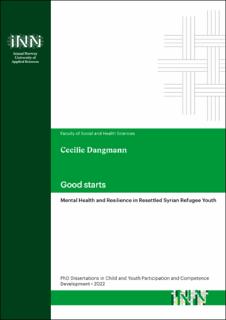Good starts : Mental Health and Resilience in Resettled Syrian Refugee Youth
Doctoral thesis
Permanent lenke
https://hdl.handle.net/11250/2977015Utgivelsesdato
2022Metadata
Vis full innførselSammendrag
Background: Children and youth are estimated to comprise almost half the world’s displaced population of 82 million, yet they are less visible in literature on refugee health. The needs of young refugees deserve
greater attention due to the long-term consequences for development, integration, health and quality of life. A good start in a new resettlement country represents an opportunity to positively influence their future health and development. Increasing our understanding of factors influencing their mental health in early resettlement could inform important policy and interventions to provide for such “Good starts”.
Aim: The overall aim was to explore mental health and resilience in Syrian refugee youth and the influence of pre-and post-migration risk and resilience factors.
Methods: One hundred sixty recently resettled Syrian youth, aged 13 to 24 years, participated in a survey at 23 schools across Norway. The study is part of the REFUGE project (REsettlement For Uprooted Groups Explored), a nation-wide survey of mental health and quality of life in refugees from Syria resettled in Norway.
Results: The Syrian youth reported high levels of mental distress and reduced quality of life. For quality of life; friendships, physical and mental wellbeing were lowscoring dimensions, whilst home and school life contributed positively. Potentially traumatic events from war and flight had significant impact on mental health, but their influence was largely through increasing the amount of post-migration stressors. Mental distress reduced the experienced quality of life, both directly but also through increasing the amount of post-migration stressors. Lastly, resilience factors were associated with better mental health as a direct main effect independent of risk. However, this was not significant for PTSD. Environmental and relational factors seemed to have the largest impact on mental health.
Conclusion: The inequities in health clearly indicate the need for policy and interventions to improve mental health and resilience in refugee youth. The complexity of interactions suggests that both universal promotive interventions, as well as targeted preventive interventions could be beneficial. Increased attention should be given to post-migration risk and resilience factors, especially environmental and relational factors.
